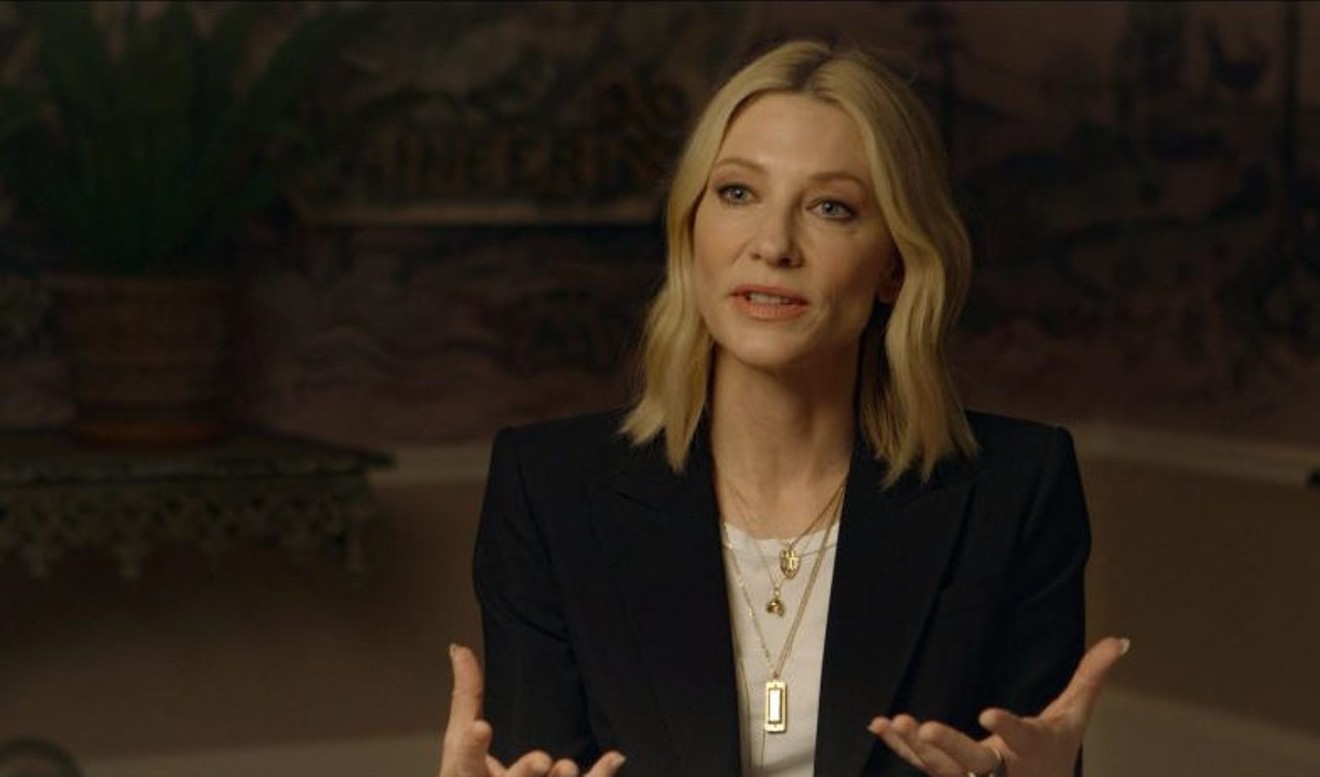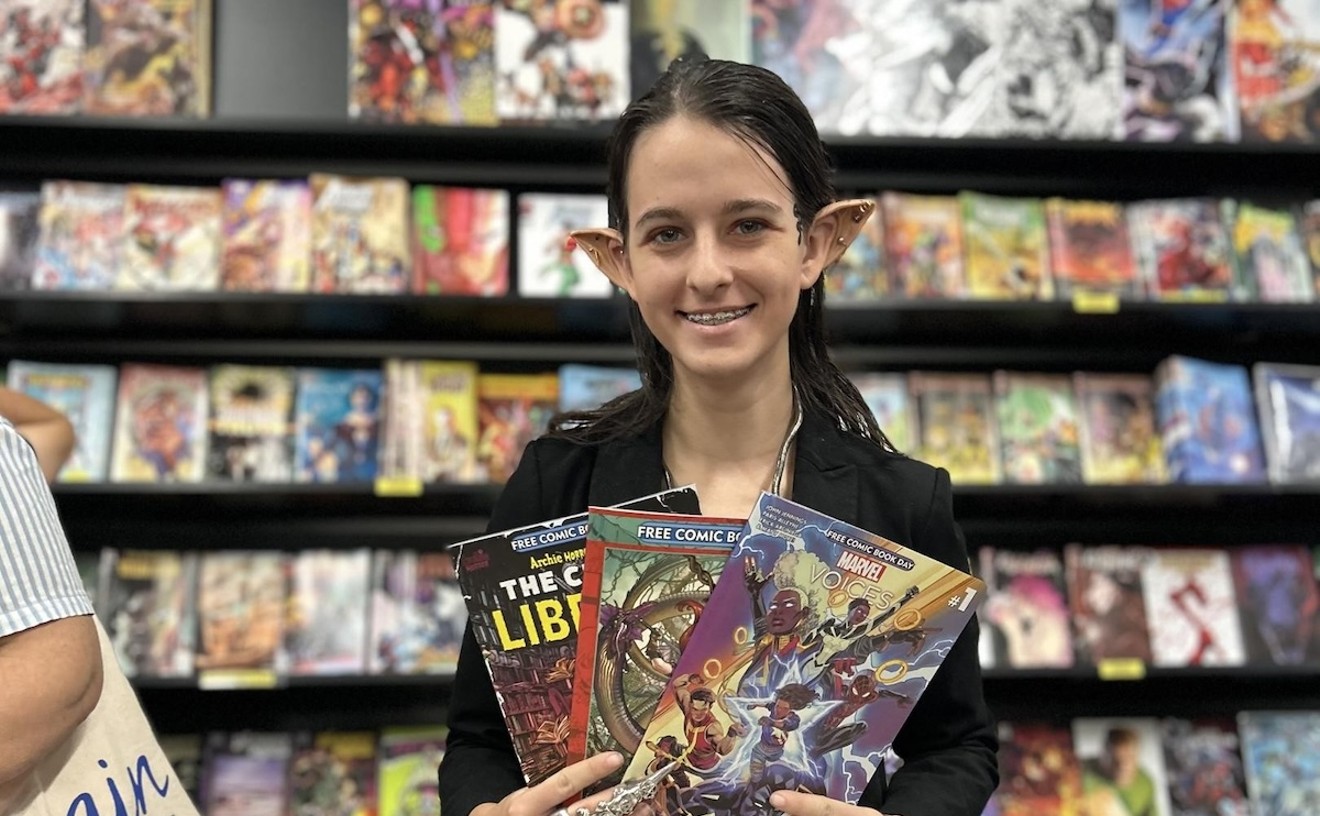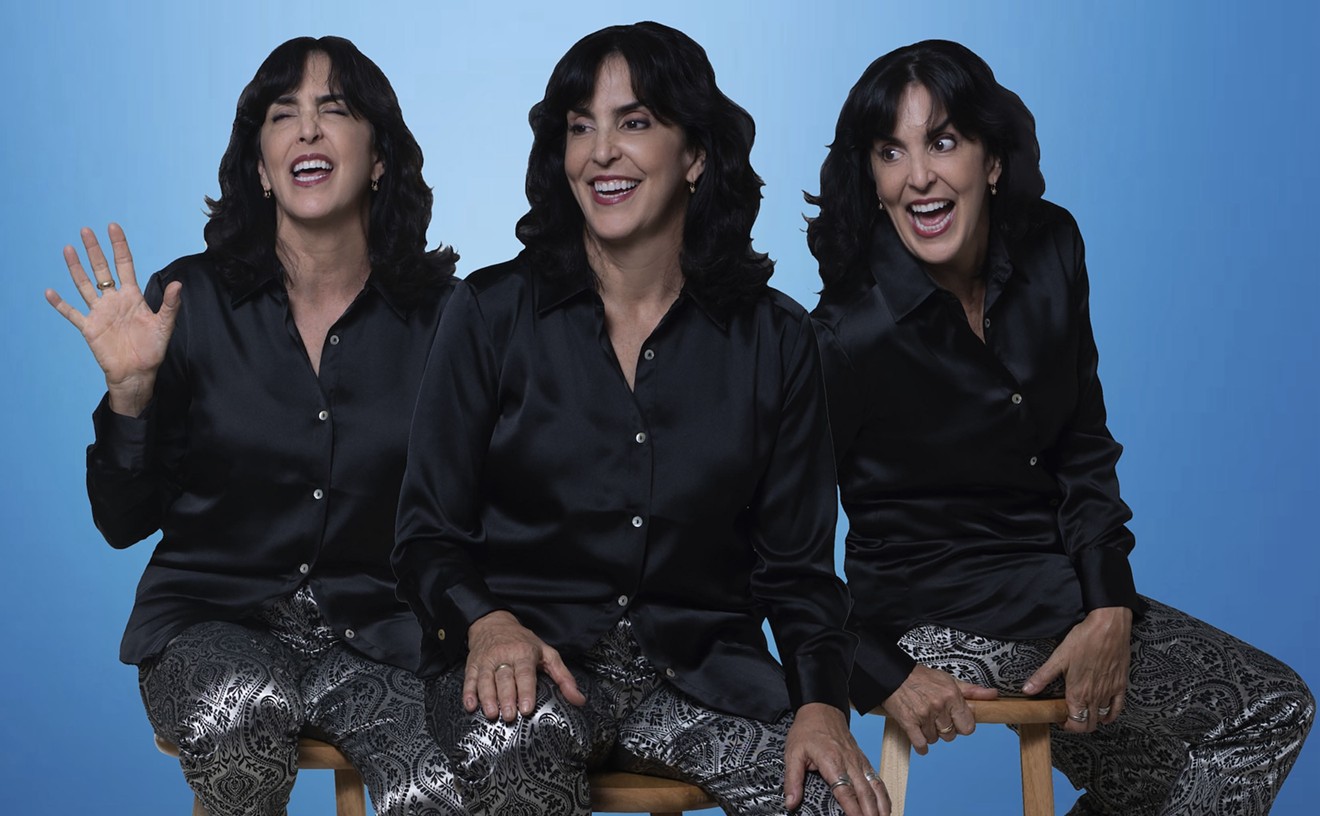This Changes Everything. This year, Miami Dade College’s Miami Film Festival takes a big risk with its opening night film. Generally a place for celebratory, uplifting cinema, the first movie to screen at the festival’s centerpiece venue, the storied Olympia Theater, is a documentary that wags its finger at the movie industry. This Changes Everything examines the inherent problem in Hollywood that allows for a creative boy’s club and stifles in-roads for women and non-white storytellers and creatives.
This changes everything is an empty phrase oft heard when a seemingly revolutionary movie speaks for a disenfranchised group and is touted as a sea change in the industry. As the documentary notes, it happened in 1991 with Thelma & Louise, written by a woman (Callie Khouri) and fronted by a pair of women (Susan Sarandon and Geena Davis) who take a nihilistic road trip that leaves the patriarchy in a smoldering ruin. Nothing, however, really changed.
With his documentary, Tom Donahue interviews some of the most vocal and well-known women working toward gender parity in the industry, including Meryl Streep, Sandra Oh, Taraji P. Henson, Chloë Grace Moretz and Davis, who founded the Geena Davis Institute on Gender in Media in 2004, a producing partner of the film. It reveals a complex web of issues, of which Harvey Weinstein is acknowledged as but a footnote. These problems date back to the advent of talking pictures and the formation of unions of directors and writers. There’s a surprising reveal of a group of women in the Director’s Guild of America who, in the mid-80s, organized a campaign of awareness but were silenced.
With examinations of studies that reveal an incredible chasm of bias and the influence Hollywood films have on the youngest of audience members, it’s a lot to take in. This is some heavy watching to kick off a film festival, but it’s a powerful, crystalizing piece that demonstrates the need for something beyond catchy hashtags to make a change. It begins with awareness but continues through action by all involved. 7 p.m. Friday March 1 at the Olympia Theater, 174 E. Flagler St., Miami; olympiatheater.org. Tickets cost $13. Guests attending include director Tom Donahue, filmmaker Maria Giese and producer Ilan Arboleda. —Hans Morgenstern
Sorry Angel. The fascinating career of Christophe Honoré has created an oeuvre dedicated to exploring the many ways people navigate relationships and sexuality. His stories range from a grieving woman who leaves behind her life in Seventeen Times Cécile Cassard and an amoral mother and son who pose as lovers in Ma Mère to the polyamorous trio of the musical Love Songs and the mythical characters that float through his contemporary adaptation of Ovid's Metamorphoses.
With Sorry Angel (or its much better French title Plaire, aimer et courir vite), Honoré hones in on how men navigated relationships in the 1990s, when queer men were still dealing with the illnesses and hardships that came with AIDS. Jacques (Pierre Deladonchamps) and Arthur (Vincent Lacoste) kick off their relationship with a meet-cute, ignoring Jane Campion's The Piano on the big screen to chat, to flirt, to make the first move towards romance. But romance for these two queer men—who live in different parts of France, who are over a decade apart in age and at vastly different points of their lives, who approach their sexuality differently—is something that needs to be navigated carefully.
But careful gets tossed out the window when love is involved, and Honoré allows his characters to get swept up in emotion. The shifts between romance and grief feel amazingly effortless: one moment Jacques is blowing smoke on a postcard after writing a letter to his lover, and the next he's grappling with a sense of suicidal sorrow. As deceptively light as Sorry Angel can appear at times, there's always a sense of melancholy in the moments of joy; the unbearable memory of knowing that you're in a doomed relationship ever present.
In a way, it serves as a quieter, but no less affecting, companion piece to Robin Campillo's 120 BPM. Neither film leans hard into sentimentality when depicting how queer men handled AIDS; tragedy exists, but it's never exploited because characters are too focused on figuring out how to live out the moments they have left. Sorry Angel is about wanting each of those moments—whether it's a long distance phone call turned playful lecture, a long walk between apartments complete with kissing and conversation, or laying naked in a hospital bed with the sick man you love—to last as long as possible, before we all inevitably end up back at "One." 7:15 p.m. Friday, March 1 at Coral Gables Art Cinema, 260 Aragon Ave., Coral Gables; gablescinema.com. Tickets cost $13. 6 p.m. Saturday, March 9 at Silverspot Cinema, 300 SE Third St., #100, Miami; downtownmiami.silverspot.net. Tickets cost $13. —Juan Antonio Barquin Diamantino. Imagine a Roger Moore-era James Bond film where the Bond girl takes the lead role. In fact, she isn’t a girl at all, but rather a vapid yet sweet, gorgeous male soccer player whose life is upended by global conspiracies and familial trauma. This is Diamantino and it has everything: undercover lesbian agents in love, characters posing as nuns and refugees in order to spy on a famous former soccer player; villainous sisters willing to sell out their brother to a fascist government; giant puppies racing across fields of pink clouds; and genetic modification prompted by a Portuguese government using racist propaganda to split from the EU.
Gabriel Abrantes and Daniel Schmidt create a world that’s as strikingly real as it is fantastic, injecting absurdism into the very real nationalism that has overtaken more than one nation and led to everything from the dissolution of a country to outright massacres. In a way, it’s just as bizarre and ambitious in its critique of how media and fascism intersect as the wrongfully maligned Southland Tales, though scaled down on every level.
Carloto Cotta plays Diamantino Matamouros like the dumbass soccer player with a heart of gold that he is, and there’s something endlessly compelling about the honesty and naivety with which he navigates every situation thrown his way. It would be easy for the filmmakers to simply turn this character into a one-note parody of soccer player Christian Ronaldo, complete with fake underwear campaigns and a six pack that appears on screen as often as possible. But Diamantino has a certain level of empathy for its narcissistic protagonist, making it all the stronger a film. 12:30 p.m. Saturday, March 2 and Sunday, March 3 at Silverspot Cinema, 300 SE Third St., #100, Miami; downtownmiami.silverspot.net. Tickets cost $13. —Juan Antonio Barquin
Non-Fiction. After a pair of stunning, metaphysical English-language thrillers starring Kristen Stewart (Clouds of Sils Maria and Personal Shopper), the uncompromising French writer-director Olivier Assayas returns to more familiar territory. Non-Fiction follows two interconnected, middle-aged couples feeling the itch of irrelevance as they age out of popular culture. Selena (Juliette Binoche) is an actress on a successful TV police show who feels her career stagnating. Her husband Alain (Guillaume Canet) heads a book publishing company moving to incorporate more digital content. Their friend, and Alain’s client, Léonard (Vincent Macaigne) writes thinly veiled fiction about his love affairs, whose adult fiction isn’t selling as well as it used to. His wife Valérie (Nora Hamzawi) is the weary chief-of-staff for the campaign of a socialist political candidate.
With an uncanny ability to employ zooms and fades, Assayas tells a story about people who peddle in fiction and spin that’s grounded in undeniable and inevitable truth. Non-Fiction proves he may be France’s greatest cinematic talent. Fueled by witty dialogue with rather brutal undertones of the characters’ cruelty toward each other, the film rides a light sense of humor that speaks to the yin and yang of relationships.
Though the dialogue reveals a concern for what it means to age out of mediums and only superficially touches on the voice of the younger generation, the bigger picture, as with most of Assayas’ movie, can be found in the undertones. There is a sense of hopelessness at times, especially in Léonard’s brutish if sometimes rather clueless novelist. But in a nice concluding scene, where Assayas symbolically finally inserts some extra-diegetic music (“Here Come the Martian Martians” by Jonathan Richman), there is a sentimental touch that allows for hope that this scraggly group of aging hipsters have a place in their own future. 1 p.m. Sunday March 3 at MDC’s Tower Theater, 1508 SW Eighth St., Miami; towertheatermiami.com. 3:30 p.m. Saturday March 9 at O Cinema Miami Beach, 500 71st St., Miami Beach; o-cinema.org. Tickets cost $13. —Hans Morgenstern
Shadow. In what may be his most brutal and goriest wuxia film to date, Chinese filmmaker Zhang Yimou is also at his most stylized. Set during China's Three Kingdoms Period (220-280 A.D.), Shadow dresses its characters in traditional outfits, but with patterns of black and white and shades in between inspired by ink wash painting. Sets are similarly designed. The monochromatic look brings out the fleshy pinks of the film’s characters, not to mention the redness of blood that often appears in geysers during the film’s vicious second half.
It takes some time to get to the action, as the dialogue and double crosses pile up between a trio of characters during the film’s first hour. The King of Pei (Zheng Kai) is a loose cannon. His military strategist Commander Yu (Deng Chao) is so crafty and skilled he finds he’s become a hermit hidden away behind the walls of the palace, leading the king’s army through a surrogate. As the first two men vie for power, this “Shadow” (also Deng) merely wants to reunite with the mother from whom he was kidnapped, and does both men’s beck and call, even when it’s in conflict with the others’ wishes.
There are also two women, Yu’s wife (Sun Li) and the King’s sister (Guan Xiaotong). Though not as fleshed out as the men, they are allowed key moments of autonomy in the plot. Still, they’re far from the female leads that fronted Zhang’s career-defining movies like Raise the Red Lantern (1991) and Shanghai Triad (1995). In fact, it’s when the women take action that the film finally takes off, starting with the reveal of umbrellas made of razor blades utilized with a “feminine” style of fighting undertaken by a motley crew of sensuous looking tatted up convicts. By the end, there’s plenty of agony and impaling accompanied by juicy sound effects and rather gruesome gaping wounds. But Zhang includes double crosses that cap the film, making it more interesting to watch. 3:15 p.m. Sunday March 3 and 9:30 p.m. Monday, March 4 at Silverspot Cinema, 300 SE Third St., #100, Miami; downtownmiami.silverspot.net. Tickets cost $13. —Hans Morgenstern
Divine Love. Drive-thru confessionals and walk-through detectors for unregistered fetuses populate the world of Divine Love, a tale of a dystopian Brazil in 2027 that doesn’t seem quite so far off from what exists today. Joana (Dira Paes) is a deeply religious woman, using bureaucracy as a means of salvation by stopping couples from filing for divorce. She does so through the pink-curtained and yellow/blue neon-lit space known as Divine Love, a healing space for couples that exists somewhere between a cult, a bible study, and a therapy session.
Gabriel Mascaro is never especially over the top with the absurd realm he and writers Rachel Ellis, Esdras Bezerra, and Lucas Paraizo have created. He's more interested in exploring how this woman functions and clashes with the society than critiquing her. Part of Divine Love's charm is that the movie, and its marvelous leading lady Paes, play so much of the film straight, using a dry humor that’s best comparable to Yorgos Lanthimos’ work.
Like many dystopian works, Divine Love focuses on how fertility is treated within his society. Religion and sex are intertwined to fascinating results, and Mascaro has no shame in presenting sex between man and woman, both as a method of procreation and as a religious experience (even when that involves switching partners for the benefit of all those involved). Sex is as erotic as it is clinical for the audience and characters alike, and it’s riveting to watch Biblical parables modernized in some capacity, especially when they don’t shy away from depicting people as sexual.
Mascaro is ultimately updating the story of Mary and Joseph for a futuristic world, one with fewer virgins and more exhaustive government control over the bodies of women. Divine Love is fascinated with the ways human beings function within a society and its expectations, queering traditional ideas about man and woman by toying with role reversals and financial dependency within a marriage, absurd hormone treatments, and even polyamory within a monogamous relationship. 6:45 p.m. Thursday, March 7, at Silverspot Cinema, 300 SE Third St., #100, Miami; downtownmiami.silverspot.net. Tickets cost $13. —Juan Antonio Barquin
Knife + Heart. Sex, love, and violence are often inextricably linked, both in cinema and in life. For decades, queer sexuality was distinctly linked to violence, be it by suicide in a work like The Children’s Hour or the murderous queers of Basic Instinct, Rope, and Cruising. Knife + Heart brings sex, love, and violence directly into queer hands, allowing them to struggle with it all in their own ways, making sex into art and death something to be laughed at and overcome, until it can’t be.
It’s 1979 in Yann Gonzalez’s film, a world in which gay porn is still being produced and projected in dark rooms where men can fantasize and pleasure themselves in presumed safety. Anne Parèze (Vanessa Paradis) is one such porn producer (loosely based on real life figure Anne-Marie Tensi), in love with her editor Loïs McKenna (Kate Moran). She's so determined to win Loïs back and keep her around that she begins to loosely craft her latest pornographic work around the brutal deaths of a number of queer actors she’s worked with.
What morbidity there is to such a premise is balanced perfectly by the sheer humor and sincerity present in crafting this narrative. There’s a real beauty to the way Gonzalez recreates the 1970s for this queer slasher: the blend of italo-disco tunes and M83’s original score, the recreation of oft-cheesy pornographic productions and all the loud moans and visual wonders that come with them, and murders that are as gay as they are creative in their execution, including but not limited to death by a dildo knife.
And one could easily mistake Knife + Heart for nothing more than a good-looking horror film, but it carries decades of queer history in its bones, from the haven of watching blue movies, to the AIDS epidemic, to the way internalized homophobia sneaks into the safest of spaces and hurts us all. Yann Gonzalez has made a queer film that understands that representation isn’t, and shouldn’t be, clean-cut, allowing its characters to feel, fight, and fuck, even when the world is telling them they shouldn’t. 9:45 p.m. Sunday, March 10, at O Cinema Miami Beach, 500 71st St., Miami Beach; o-cinema.org. Tickets cost $13. —Juan Antonio Barquin
Miami Film Festival 2019. March 1 through 10 at various venues; 844-565-MIFF; miamifilmfestival.com. Tickets to most screenings cost $13.
[
{
"name": "Air - MediumRectangle - Inline Content - Mobile Display Size",
"component": "19274298",
"insertPoint": "2",
"requiredCountToDisplay": "2"
},{
"name": "Editor Picks",
"component": "17482312",
"insertPoint": "4",
"requiredCountToDisplay": "1"
},{
"name": "Inline Links",
"component": "18711090",
"insertPoint": "8th",
"startingPoint": 8,
"requiredCountToDisplay": "7",
"maxInsertions": 25
},{
"name": "Air - MediumRectangle - Combo - Inline Content",
"component": "17482310",
"insertPoint": "8th",
"startingPoint": 8,
"requiredCountToDisplay": "7",
"maxInsertions": 25
},{
"name": "Inline Links",
"component": "18711090",
"insertPoint": "8th",
"startingPoint": 12,
"requiredCountToDisplay": "11",
"maxInsertions": 25
},{
"name": "Air - Leaderboard Tower - Combo - Inline Content",
"component": "17482313",
"insertPoint": "8th",
"startingPoint": 12,
"requiredCountToDisplay": "11",
"maxInsertions": 25
}
]
















